Russia’s ‘Muslim Problem’ and the Crocus City Hall Attack
Horrendous bombing wasn’t Russia’s first by Muslim militants
The massacre at Moscow’s Crocus City Hall theater, apparently by ISIS (K), which has taken the lives of at least 133 people and left 140 injured, is a horrendous reminder of the issues that Russia faces over its dealings with Muslims, whether among its own republics, in the “near abroad,” or where it has intervened in the recent past – Afghanistan and Syria. There have been at least a half-dozen attacks in or near Moscow by Muslim terrorists, most of them Chechen militants, over the past 25 years.
Those with longer memories, notably in Turkey, have cause to remember Imperial Russia’s genocide of Circassians in the 1850s, which resulted in 1 to 1.5 million deaths. ISIS may have started in Iraq and Syria and failed as a would-be state but its tentacles are long and touch aggrieved Muslims in many locations. The details of ISIS (K) and its objectives, beyond killing Russians, have yet to be determined, although the four who entered the theater have been captured alive, along with seven other suspects and presumably will be interrogated exhaustively.
The organization, Islamic State of Iraq and Syria (Khorasan), is known in Arabic by its acronym DAESH. ISIS is sometimes called ISIL as a more precise translation of the Arabic words, L being for Levant.
Initial reports said at least one of the captured culprits was from Tajikistan, which has its own history of militancy as well as bordering Afghanistan where Tajiks are a large minority. The Afghan part of ISIS has a particularly bloodthirsty reputation. Perhaps this is payback for Russian support for the Syrian government and displaying as much disregard for civilian life as the Assad regime itself.
But they are not alone. The Muslim militants from the North Caucasus republics of Chechnya, Dagestan, and Ingushetia have perhaps more than equal motivation for terrorism against Russia. As recently as March 4, the Russian news agency Tass reported that six “militants” had been killed in an operation in Ingushetia where there has been a low-level insurgency for several years.
The Chechen leader Ramzan Akhmadovich Kadyrov may have turned his coat to relinquish nationalism and stay in power in Chechnya, and been given a free hand by Russia. He has provided thousands of fighters to support the Russian leader Vladimir Putin’s war against Ukraine. But there are still many Chechens who remember that the late Russian leader Boris Yeltsin and Putin were utterly ruthless in crushing the Chechens, who were supposed to be compatriots in the Russian Federation, in the wars of 1994-6 and 1999-2000. Many Chechens live in Moscow.
The rugged North Caucasus region has long been a Russian problem – indeed ever since Empress Catherine the Great in the 18th century began to try to bring it under Russian control. The Russians variously claimed that the inhabitants were not only Muslims to be converted to Christianity but wild people who needed to be civilized. That culminated in the genocide of the most recalcitrant, the Circassians. They lost about 90 percent of their population either to massacre or flight to Ottoman lands and dispersal around its empire.
Most of Russia’s non-Russian Muslims have been less difficult, but there are still a lot of them, notably in the republic of Tatarstan which is astride the middle Volga River and, like its neighbor, the Republic of Bashkortostan, has a Turkic-speaking, at least nominally Muslim majority.
These peoples have been becoming more conscious of their identity reflected in a large modern mosque in Kazan, the Tatarstan capital. This has been the result of two processes. First, the Soviet Union had so many large minorities that it necessarily had to accommodate their national sentiments even if it suppressed religion generally. Hence their republics usually had local, Moscow-approved leaders and could keep their languages and many customs. The Russian Federation today, shorn of central Asian stans as well as Ukraine and the Baltics, is a much more Russian place and Putin leans on appeal to ethno-nationalism and the Russian Orthodox church.
Second, people in these republics are aware of events in the Muslim world generally, raising consciousness of their history and their links to the Turkic world generally and past links to both the Ottoman Empire and Central Asia. This is not a major problem for Moscow but it is an issue of which it is aware and is hard to address, particularly at a time of war justified in terms of specifically Russian history long before Russia’s conquest of the Kazan Khanate. Russia also has a significant number of workers from former Soviet Turkic-Muslim states.
One question now is how Russia will retaliate. Putin is no more squeamish about mass killing than Netanyahu, as he showed in bringing down the executive jet last August in which Wagner Group leader Yevgeny Prigozhin was a passenger, and is equally ethnocentric. Putin cannot afford any action which seems specifically against its non-Russian and especially Muslim people at a time when it is looking for Afro-Asian support vis-a-vis the West. Any attempt to blame Ukraine, as Putin has done initially, is simply an evasion of Russia’s Muslim problem.





It's clear the author was trying to write (what he considered to be) a rational and lucid analysis of the very real problem Russia has with it's Muslim population, but in the final paragraph his hatred of the Jews is revealed once more. What is it with left wingers and their pathological hatred of the Jews? And don't pretend this was simply criticism of one specific Jew, Netanyahu.